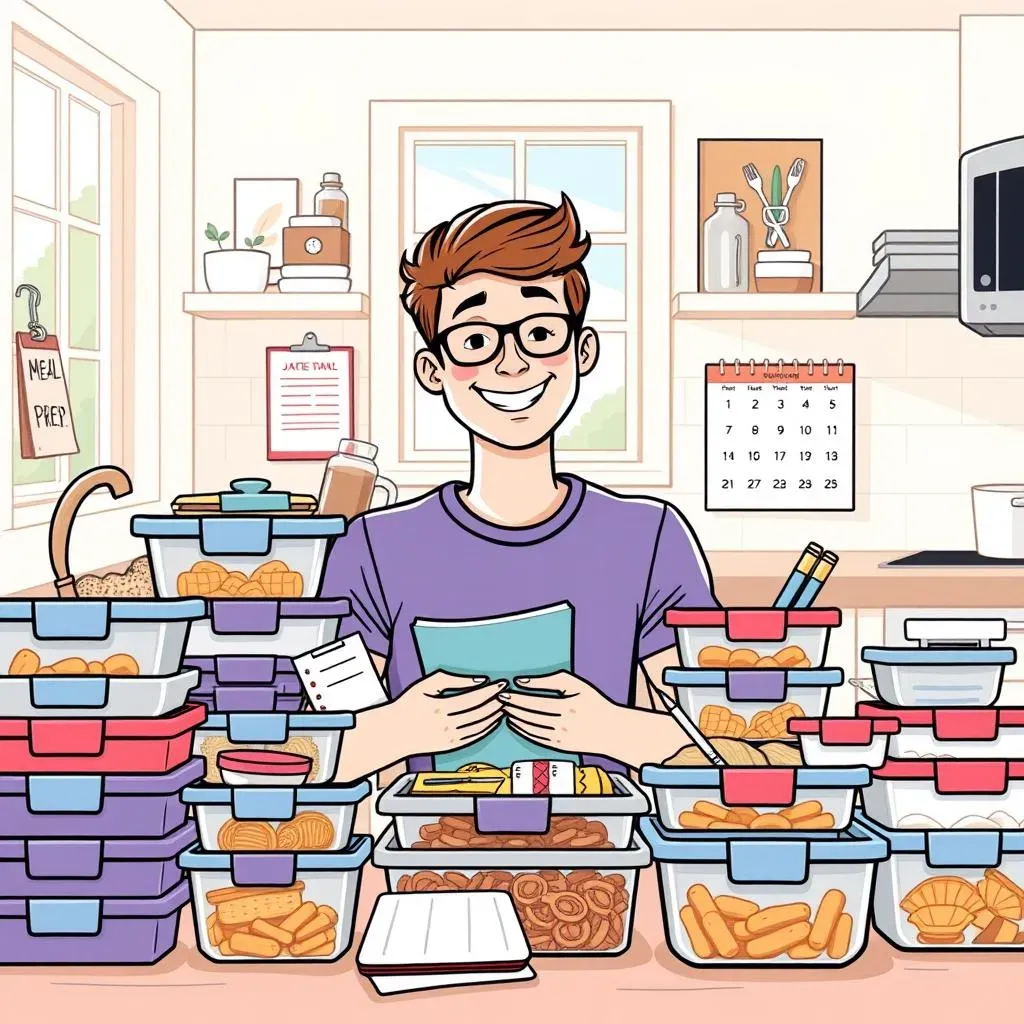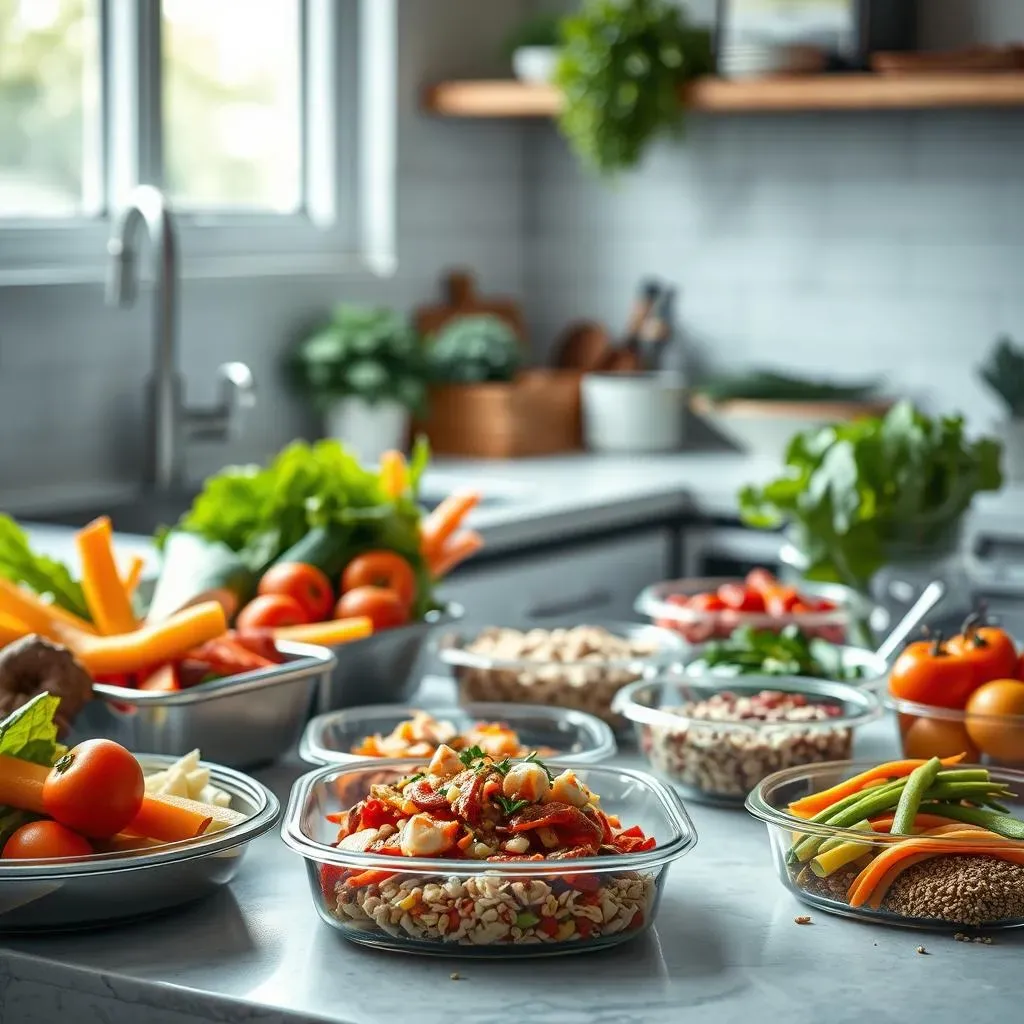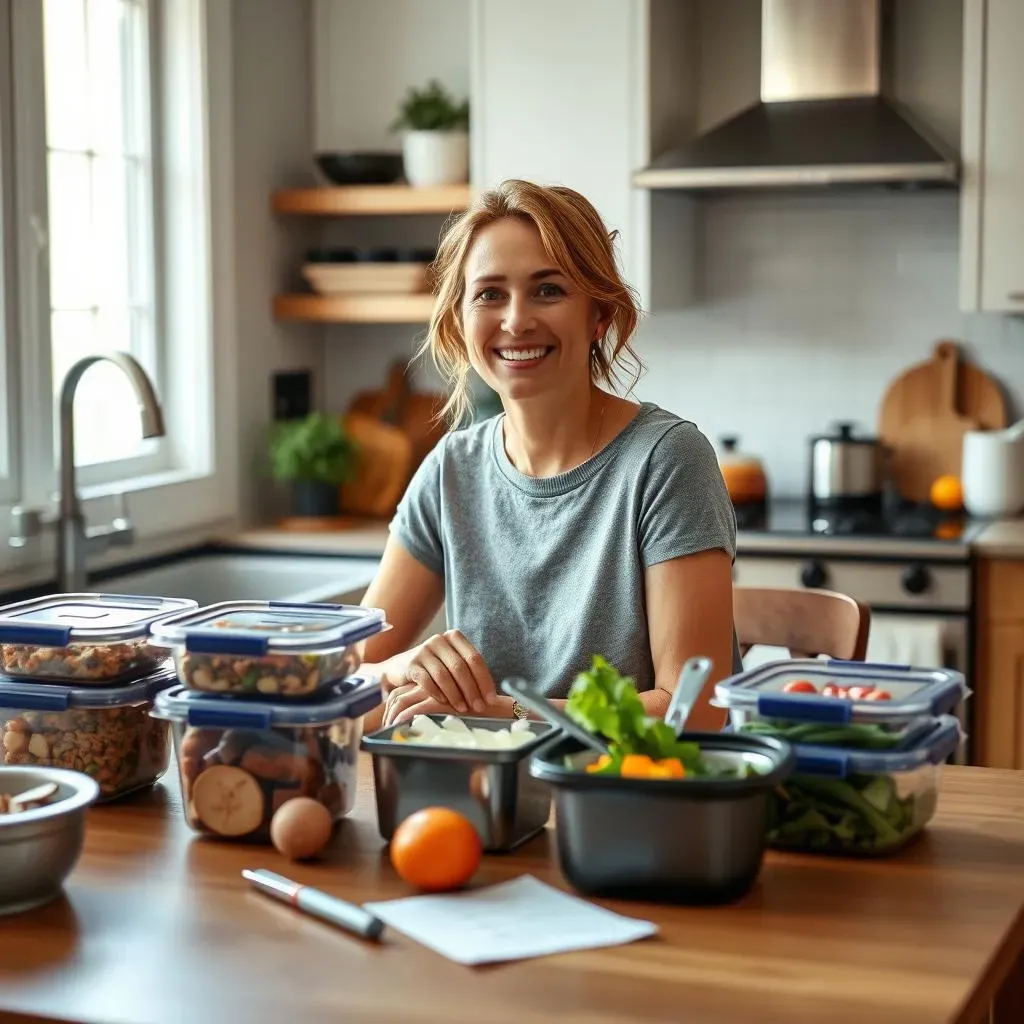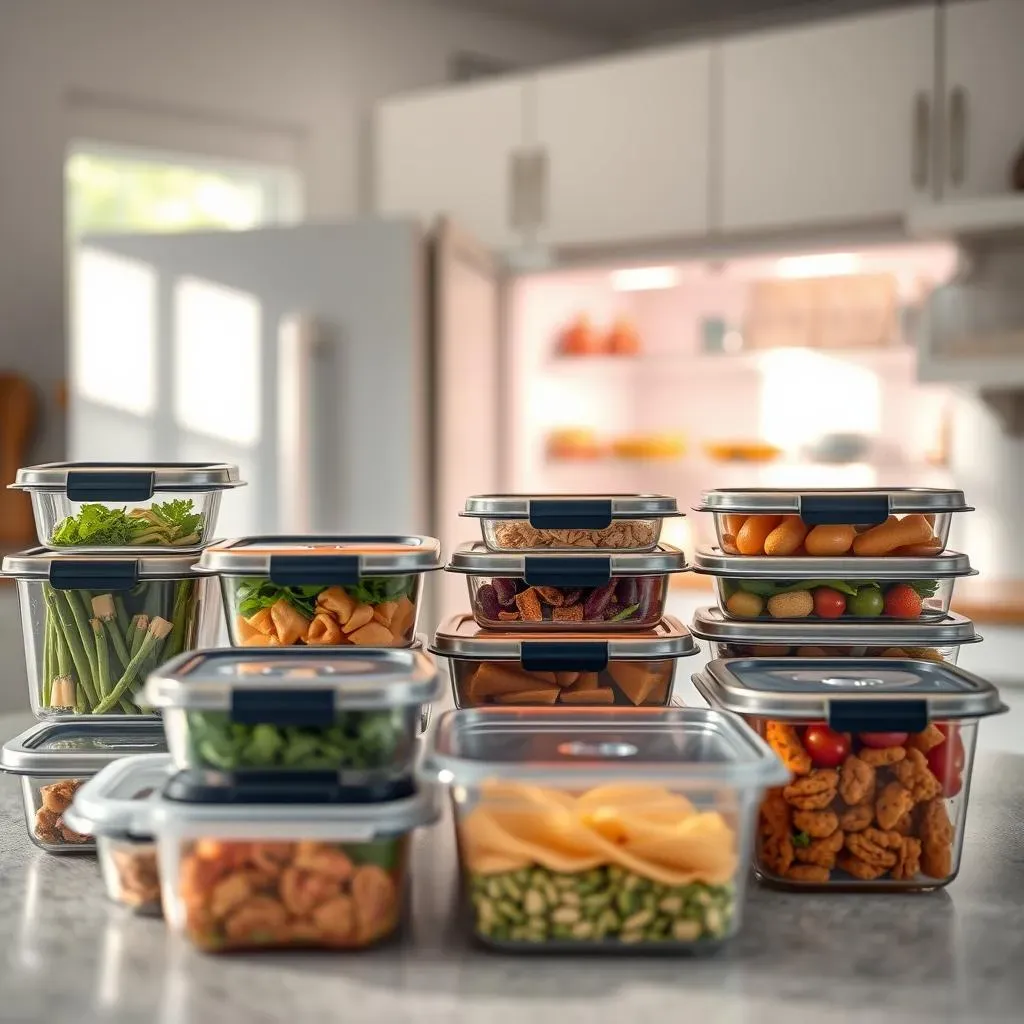Table of Contents
Ever feel like you're constantly battling the clock, scrambling to figure out what's for dinner? Or maybe you're tired of eating out and want to take control of your diet without spending hours in the kitchen every day? That's where the magic of meal prepping comes in. It's not just about cooking a bunch of food on Sunday and eating the same thing all week; it's about creating a system that works for you. This article will walk you through the essential keys to meal prepping, making it less of a chore and more of a game changer for your week. We'll explore how planning ahead, using the right techniques, and thinking about storage can transform your relationship with food. Get ready to unlock the secrets to stress-free meals and reclaim your time, all while enjoying delicious and healthy food. Let's get started and discover the keys to meal prepping that will work for you!
Planning is Key: Setting Yourself Up for Meal Prep Success

Planning is Key: Setting Yourself Up for Meal Prep Success
The Power of a Good Plan
Alright, let's talk planning. It’s not the most exciting part, I know, but trust me, it’s the backbone of successful meal prepping. Think of it like building a house; you wouldn't start without a blueprint, right? Meal prepping is the same. If you just wander into the kitchen and start grabbing random ingredients, you're setting yourself up for chaos. The key is to sit down, maybe with a cup of tea or a glass of wine, and think about what you actually want to eat during the week. What are your go-to meals? What are some new things you've been wanting to try? Don't overcomplicate it. Start with a few simple recipes that you know you'll enjoy.
I used to just wing it, and my fridge would end up a graveyard of half-used veggies and mystery containers. Now, I make a list of the meals I want, check what ingredients I already have, and then make a shopping list for what I need. It sounds like a lot, but it makes the whole process so much smoother. It takes some time at first, but once you get into the rhythm, it's like a well-oiled machine. It is the best way to avoid the dreaded 'what's for dinner' panic every evening. Seriously, it's a game-changer.
Planning Step | Why it Matters |
|---|---|
Choose Your Meals | Avoids decision fatigue later. |
Check Your Inventory | Saves money, reduces waste. |
Make a Shopping List | Helps you stay on track at the store. |
Scheduling Your Prep Time
Okay, so you've got your meals planned, now it's time to think about when you're actually going to do the prepping. I like to think of it like a workout schedule, you wouldn't just randomly hit the gym, would you? Same goes for meal prep. You need to set aside some dedicated time. For me, it’s usually on Sunday afternoons. I put on some music, maybe a podcast, and just get to it. Find a time that works for you, maybe it’s a weekday evening, or even spread it out over a couple of days. Consistency is key.
The key here is to treat this time like an important appointment with yourself. Don't let other things encroach on it. If you try to squeeze it in between other tasks, you're going to be rushed and stressed, which defeats the whole purpose. This is your time to get organized and make your week easier, so make it a priority. I know it can feel like a lot of time commitment initially, but it really does save you so much time (and stress!) during the week. Remember, a little bit of planning goes a long way in the meal prep world.
- Pick a consistent day and time
- Treat it as an important appointment
- Don't rush it, enjoy the process
Essential Meal Prep Keys: The HowTo

Essential Meal Prep Keys: The HowTo
The Core of Meal Prep: Cooking Smart
Now that you've got your plan down, let’s talk about the actual cooking. This is where the rubber meets the road, or the spatula meets the pan, if you will. The key here is efficiency. You don’t want to be spending all day in the kitchen. Think about cooking in batches. For example, if you’re making chicken, cook a big batch that you can use in multiple meals. Roast a bunch of veggies at once. This way you're not making a mess every single day. It also makes the whole process faster. I like to pick recipes that use similar ingredients; it cuts down on prep time and reduces waste. When I first started, I would try to make a bunch of different, complicated meals and I would get burnt out fast. Now, I keep it simple and efficient. It’s not about being a gourmet chef, it's about getting healthy food on the table without the fuss.
Another tip is to get your mise en place on. That's a fancy French term that just means "everything in its place." Before you start cooking, chop all your veggies, measure your spices, and get everything ready to go. It’s like having all your tools laid out before starting a project. It speeds things up and prevents those moments where you're scrambling for something while your food is burning. Trust me, being organized makes a huge difference. It's the secret weapon of any good cook, even if you're just cooking for yourself. It makes the cooking process smoother, faster, and much more enjoyable. It’s not about being perfect, it’s about being prepared.
Cooking Smart Tip | Why It Works |
|---|---|
Batch Cooking | Saves time and effort. |
Similar Ingredients | Reduces prep time and waste. |
Mise en Place | Keeps you organized and efficient. |
Balancing Flavors and Textures
One of the biggest mistakes people make with meal prep is creating meals that are just plain boring. Nobody wants to eat the same bland chicken and steamed broccoli every day. The key is to think about flavors and textures. Add some herbs and spices to your dishes. A little lemon juice, some garlic, or a sprinkle of chili flakes can make a huge difference. And think about textures, too. A little crunch from some toasted nuts, or some creamy avocado can make your meal so much more enjoyable. It's about creating a well-rounded meal that you actually look forward to eating. I like to experiment with different flavor combinations. Sometimes I’ll try a Mediterranean theme, other times I’ll go for Asian-inspired flavors. It keeps things interesting and prevents food boredom. You don't need to be a master chef, but a little creativity goes a long way.
Don't be afraid to mix and match different components. Maybe you roasted some chicken and veggies, you can add them to a salad one day, or put them in a wrap the next. The key is to be flexible and think about how you can use your prepped ingredients in different ways. It’s like building with LEGOs. You have all these individual pieces, but you can combine them to create something new and exciting each day. It makes meal prep less monotonous and keeps your taste buds happy. It's about creating meals that are not only good for you but also enjoyable. Remember, eating healthy shouldn't feel like a punishment. It should be something you look forward to.
- Add Herbs and Spices
- Incorporate Different Textures
- Mix and Match Components
Making Meal Prep Work for You: Overcoming Common Hurdles

Making Meal Prep Work for You: Overcoming Common Hurdles
Tackling the "I'm Bored" Blues
Alright, let's be real, one of the biggest hurdles with meal prepping is the dreaded food boredom. It’s easy to fall into a routine and end up eating the same thing day in and day out, which, let's face it, is a recipe for culinary disaster. The key here is to be proactive. Don't wait until you're completely sick of your meals to make a change. I like to switch up my recipes every couple of weeks, or even just tweak them slightly with different spices or sauces. It's like giving your taste buds a little vacation. You don't need to be a gourmet chef, just a little bit of variety can go a long way. It’s about keeping things interesting and preventing that "ugh, not again" feeling.
Another trick I use is to have a list of "go-to" flavor profiles or themes. So, one week I might do Mediterranean-inspired meals, with lots of lemon, herbs, and olives. The next week I might go for something spicier with a focus on Asian flavors. It helps to keep my meals varied, and it also makes planning easier. It's like having a playlist of different genres of music, instead of listening to the same song on repeat. This approach helps prevent meal prep from feeling like a chore and turns it into a fun, creative process. Remember, the goal is to make healthy eating enjoyable, not something you dread.
Boredom Buster | How It Helps |
|---|---|
Switch up recipes regularly | Prevents monotony. |
Use flavor themes | Keeps meals varied. |
Experiment with spices | Adds interest and depth. |
Conquering the Time Crunch
Okay, let's face it, time is a precious commodity, and we all seem to be short on it. One of the biggest reasons people give up on meal prepping is that they feel like it takes up too much time. But the truth is, it doesn't have to be a massive, all-day event. The key is to break down the process into smaller, more manageable chunks. Instead of trying to do everything at once, consider doing some prep work during the week. Maybe you chop some veggies on Monday night, or cook some grains on Wednesday. It’s like doing a little bit of exercise every day instead of trying to cram it all in on the weekend. This way, meal prep doesn't feel like such a big commitment, and you're less likely to get overwhelmed.
I also like to use shortcuts whenever I can. Pre-chopped veggies are a lifesaver when I'm short on time. And frozen veggies are just as good as fresh, and they often save you money. Don’t feel like you have to make everything from scratch. The key is to be smart and efficient with your time. It’s about finding ways to make meal prep fit into your life, not the other way around. Remember, the goal is to make healthy eating easier, not more complicated. And every little bit of prep you do during the week saves you valuable time later.
- Break down prep into smaller tasks
- Use shortcuts like pre-chopped veggies
- Don't feel like you need to cook everything from scratch
Dealing with Unexpected Changes
Life is unpredictable, isn't it? Sometimes, no matter how well you plan, things just don't go as expected. Maybe you get stuck late at work, or you end up having an unexpected dinner invitation. The key is to have a backup plan. I like to keep some simple, quick-to-make meals in my back pocket, just in case. Maybe it’s some eggs, a can of tuna, or a frozen pizza (yes, even meal preppers sometimes need a quick fix!). Don’t think that just because you’ve meal prepped, you’re locked into your plan. Flexibility is important. It’s about being able to adapt to whatever life throws your way. And not letting a change in plans derail your entire week of healthy eating.
And remember, it's okay to have an off day. If you end up eating out or skipping a meal, don't beat yourself up about it. Just get back on track with your next meal. Meal prepping is a journey, not a destination, and there will be bumps along the way. The key is to be kind to yourself, learn from your experiences, and keep moving forward. It’s not about being perfect, it’s about being consistent. It's about creating a sustainable system that works for you, and that means being flexible enough to handle the unexpected.
Storage Solutions and Keeping it Fresh: Meal Prep Keys

Storage Solutions and Keeping it Fresh: Meal Prep Keys
The Right Containers: Your Meal Prep's Best Friend
Okay, so you've cooked all these amazing meals, now what? The key is to store them properly so they stay fresh and delicious all week. This is where good containers come into play. I used to just use whatever plastic containers I had lying around, and my food would end up a soggy mess. Investing in some good quality containers is a game changer. I prefer glass containers because they're easy to clean, don't stain, and don't leach any weird chemicals into your food. But if you're on a budget, plastic containers work too, just make sure they're BPA-free. The key is to have a variety of sizes and shapes, so you can store everything from soups and stews to salads and snacks. I also like to get containers that stack easily, so they don't take up too much space in my fridge. It's like having a well-organized pantry, but for your fridge. It makes everything so much easier to find, and it keeps your food fresh for longer.
Another thing to consider is how you're going to portion your meals. If you're making individual meals, you'll want containers that are the right size for a single serving. If you're prepping components, like roasted chicken and veggies, you'll want larger containers that can hold more food. I also like to use smaller containers for sauces and dressings, so they don't make my meals soggy. The key is to think about how you're going to use your food and choose your containers accordingly. It’s not about spending a fortune on fancy containers, it's about having the right tools for the job. And trust me, good containers make a huge difference in how your meals taste and how long they last. It's like having a good set of knives in the kitchen; they make the whole cooking process so much more enjoyable.
Container Type | Why It's Good |
|---|---|
Glass Containers | Easy to clean, no stains, chemical-free. |
BPA-Free Plastic Containers | Affordable, lightweight. |
Stackable Containers | Saves space in the fridge. |
The Fridge and Freezer: Extending Your Meal Prep's Lifespan
Once you've got your meals in their containers, it's time to think about where you're going to store them. The fridge is your go-to for most meal prepped items, but the key is to make sure your fridge is at the right temperature. You want it to be cold enough to keep your food safe, but not so cold that it freezes everything. I like to keep my fridge around 40 degrees Fahrenheit. It also helps to organize your fridge so you can easily find what you need. I keep my prepped meals in the most visible spot, so I don't forget about them. It's like having a well-organized closet; you know exactly where everything is, and you don't end up forgetting about stuff in the back.
The freezer is another great option for extending the life of your meal prepped food. If you know you're not going to eat something within a few days, throw it in the freezer. Soups, stews, and casseroles freeze particularly well. I like to use freezer-safe containers or freezer bags, and I always label everything with the date, so I know how long it's been in there. It's like having a backup plan for your backup plan. It gives you so much more flexibility, and it helps you avoid food waste. And when you're in a pinch, having a freezer full of prepped meals is a lifesaver. It’s not about being a hoarder, it’s about being prepared. And it makes those busy weeknights so much easier.
- Keep your fridge at 40 degrees Fahrenheit.
- Organize your fridge for easy access.
- Use the freezer for longer storage.
- Label everything with the date.
Keeping Things Fresh: Tips and Tricks
Okay, so you've got your containers, your fridge, and your freezer all set up. Now, let's talk about some tips and tricks for keeping your meal prepped food fresh. One of the biggest mistakes people make is combining wet and dry ingredients too soon. For example, if you're making a salad, keep the dressing separate until you're ready to eat it. Otherwise, your salad will get soggy. The same goes for things like sauces and toppings. I like to store them in small containers and add them right before I eat. It's like having a gourmet restaurant experience in your own home. It keeps things crisp and fresh, and it makes your meals so much more enjoyable.
Another tip is to use parchment paper or paper towels to absorb moisture. I like to put a paper towel in the bottom of my salad containers to keep them from getting soggy. It’s like having a little sponge in your container that soaks up all the extra moisture. It's a simple trick, but it makes a big difference in how your meals taste. And don't forget about the power of herbs. Fresh herbs can add a lot of flavor and aroma to your meals, but they can also wilt quickly. I like to store them in a damp paper towel in a plastic bag, and it keeps them fresh for longer. It's about taking the time to do the little things that make a big difference. And it’s about making your meal prep experience as enjoyable and successful as possible. Remember, the goal is to make eating healthy easy and delicious, not a chore.